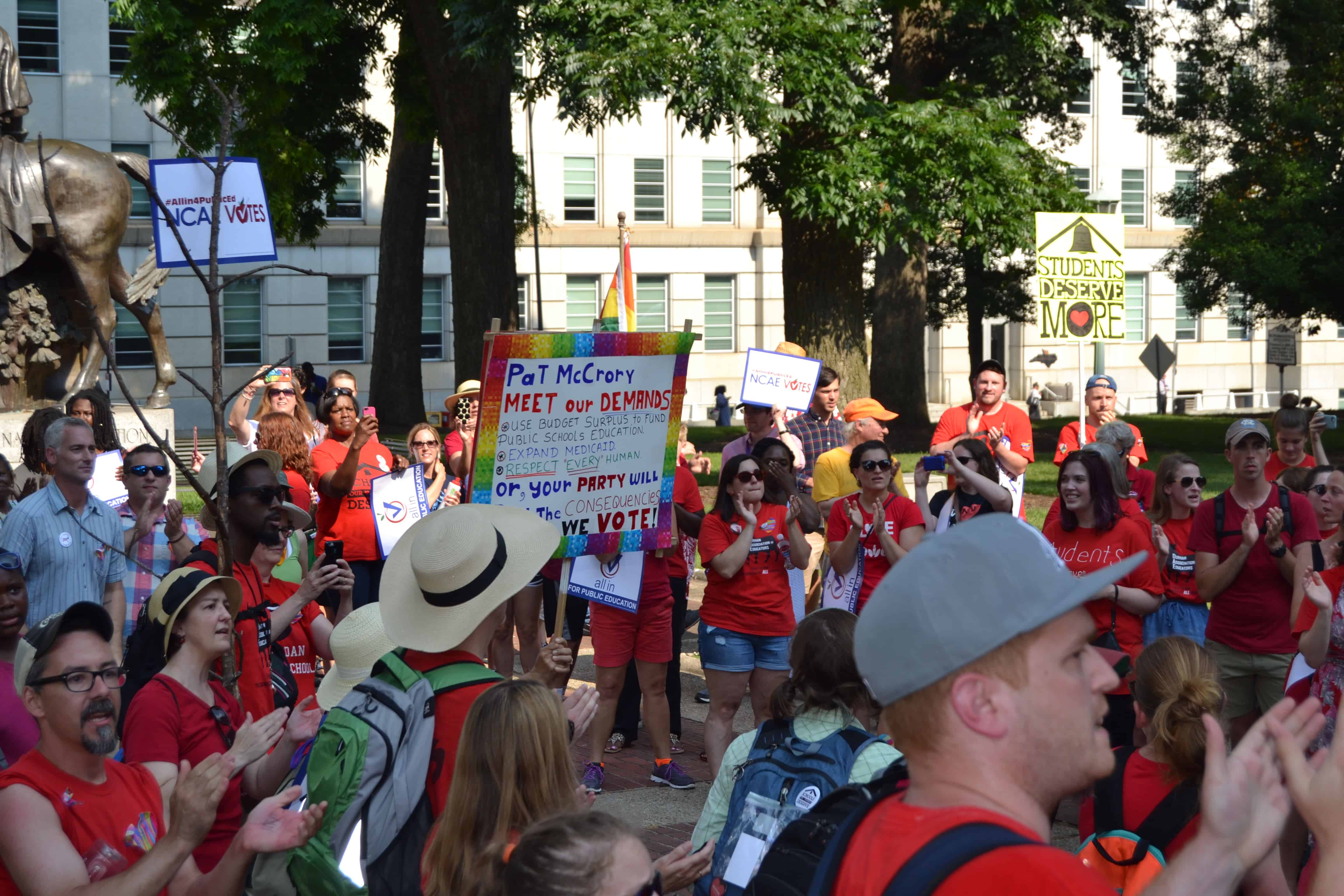Supporters say bill is about student safety; others worry activists arrested during protests could lose licensure.
For the better part of 24 hours, Anca Stefan’s phone has been humming. Messages, calls, social media notifications are pouring in from her now viral, diaristic account of her arrest, along with 13 other protesters, last week for demonstrating against state education policies near the state capitol in Raleigh.
Stefan, a social studies teacher in a Durham public school, had penned a passionate Facebook screed about her otherwise peaceable booking for impeding traffic and resisting an officer—she says one officer called her protest the “noblest” reason for arrest—after Stefan’s group blocked off the intersection of Fayetteville and Morgan streets in Raleigh during rush hour.
It came after a fiery protest of the General Assembly and Gov. Pat McCrory’s education policies on the steps of the legislative building. Following the protest, Stefan and dozens more walked to the capitol building, seeking an audience with McCrory’s top education advisers.
McCrory advisers had reportedly agreed to meet with the group when the governor himself declined, citing a scheduling conflict. But when protesters found the capitol doors locked around 5 p.m, they took to the streets.
Stefan’s story has been shared more than 11,000 times on Facebook, and picked up for publication by The News & Observer. Today, sitting in a downtown Durham coffee shop, she seems focused, and more than a little energized.
“Gov. McCrory didn’t do right by me, but he can still do right by my students,” she says.
She says education funding cuts handed down by GOP leaders and McCrory set public schools up for failure, comparing it to being asked to cook a meal without any tools.
“You have no pots and pans. You have no knives and they judge you for the food you make.”
Last week’s arrests mark just the latest example of educators picketing at the legislature and the capitol in recent years, protesting, among other things, withering education funding, school privatization and a massive ramp-up of private school vouchers proposed in at least one version of the legislature’s dueling budget proposals.
Stefan, with a group that calls itself Organize 2020, is also protesting GOP leadership’s refusal to accept a federally-paid Medicaid expansion, which could have offered services to an additional 500,000 North Carolinians. Stefan says she knows of students who, rather than focusing on their studies, are forced to care for family members not covered by the healthcare assistance program.
Indeed, educators have been among the loudest protesters in Raleigh in recent years. In 2013, dozens of advocates, including the leadership of the N.C. Association of Educators (NCAE), the most powerful teacher lobbying group in Raleigh, were arrested and charged with failure to disperse when they protested inside the legislative building in Raleigh.
Yet last week’s arrests come at a time when the legislature is in the midst of a pivotal discussion on teacher background checks, a statewide expansion of fingerprint checks for prospective teachers that’s largely earned bipartisan support in Raleigh this year.
Senate Bill 867, titled “Protect Students in Schools,” would replace a patchwork of local school district policies on background checks with one statewide policy, which, as of the last publicly released version, requires fingerprint checks for all teachers seeking licensure in the state.
It comes after a February report from USA Today slapped North Carolina with a grade of “F” for its background check policies.
Decisions about whether previous convictions make a teacher unfit for licensure, which must be renewed every five years, would be left to the State Board of Education, a panel of McCrory appointees.
The legislation includes dozens of crimes that would be flagged, including major crimes such as robbery and murder, as well as some lesser charges such as “refusal to disperse” typically aimed at protesters.
The legislation is still being discussed in the state House and education advocates believe a forthcoming House-backed version of the bill may shift the power to local boards, although the legislation’s fate is unclear at this point. A version has been approved by the state Senate and is expected to be taken up in a House finance committee in the coming days.
Sen. Chad Barefoot, a Wake County Republican who co-sponsored the bill and has been among its leading proponents in the legislature, could not be reached for comment by Policy Watch.
Discussion about the bill has largely centered on a provision requiring that applicants foot the roughly $50 bill for the background checks, with some worrying that it would dissuade potential teachers from applying in the midst of a well-documented teacher shortage in North Carolina.
Critics have also pointed out that the legislation excludes private school teachers from fingerprint checks, despite reported accounts of wrongdoing by educators with a criminal history in private schools.
Yet the bill has also prompted concerns in Raleigh over whether the bill’s tenets could be used to force out teachers who practice civil disobedience like Stefan.
The idea doesn’t seem to faze Stefan, who says she teaches the French philosopher Voltaire’s writings on freedom of expression to her middle-school students. “I take it very seriously,” she said. “Dissent is a really healthy part of democracy.”
And Stefan scoffs at the idea that the bill, whether or not it makes protest more difficult for educators, will change her behavior. “To prioritize my own employment over my students’ needs, it feels wrong,” she says. “As long as I can raise my voice for my kids to defend them against attacks that are cruel, I’ll do it.”
Education advocates, though, say they have noted the concerns about teacher background checks and, for the most part, they believe educators’ right to protest will continue unabated, particularly if hiring decisions are left to local school boards and administrators, rather than state officials.
Mark Jewell, president-elect of the NCAE, was one of dozens arrested at the legislature during protests in 2013. On Wednesday, Jewell said he believes local boards would overlook minor offenses handed down during protests.
“We fully support a district’s right to make sure everyone in a school district is safe,” Jewell said.
Jewell added that, if the legislation leaves the State Board of Education with the power to deny teacher licenses based on past crimes, he expects their decisions will be “independent,” and not tainted by partisan politics.
“I have found that the (SBOE) have been very nonpartisan in many of the decisions that they face.”
Leanne Winner, director of governmental relations for the N.C. School Boards Association, which represents local boards of education in Raleigh, agrees, emphasizing that the bill should not be assumed to offer a presumptive ban on teachers charged with any crimes.
“It’s more of a flag,” Winner said. “Let’s look at it, peel back the onion a little bit, but it’s not a mandatory exclusion.”
State Board Chairman Bill Cobey, a Republican appointee of McCrory, could not be reached to comment on the proposal this week, but board attorney Katie Cornetto told Policy Watch that she expects a legislative discussion of the “practical” impacts of the bill in the coming days.
Most in Raleigh have been supportive of the bill’s intent, Cornetto says, which was to link fingerprint checks to teacher licensing and thereby create a statewide procedure.
“The intended purpose was to make sure we protect our students in the classroom,” Cornetto said. “It’s in the ‘devil is in the details’ phase now. I’m not sure where the final version will be.”
Cornetto added that her office already makes discretionary decisions about whether or not past offenses disqualify teachers. The new legislation would simply be “another tool” to ensure that applicants are being truthful about their pasts.
She said there is no “easy yes or no” for determining whether activists arrested during protests could lose licensure. “The circumstances have to be evaluated,” she said.
She said state leaders’ focus in evaluating criminal history will be in determining if an individual shows a pattern of law-breaking.
“We have teachers who have made mistakes, and they’ve corrected them and they’re just fine role models now.”
Should an applicant be denied licensure, Cornetto pointed out they will still have the option of appealing the decision, first to the state’s Office of Administrative Hearings, and then to the N.C. Superior Court.
For her part, Stefan says the debate over teacher background checks isn’t likely to move her, and many other disgruntled teachers, one way or the other.
“We’re past demoralized,” she said. “We’re already 43rd nationally in per-pupil spending. We’re 41st in teacher pay. There’s nothing else they can take from us.”
Editor’s Note: This article was published by NC Policy Watch on June 22, 2016.



